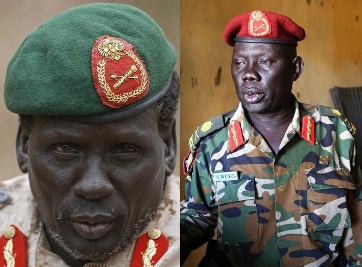S. Sudan army commander downplays impact of sanctions
January 4, 2015 (JUBA) – The South Sudanese chief of staff Gen. Paul Malong Awan has downplayed the likely implications of last year’s sanctions imposed on two senior army commanders, describing it as a move to demoralise the army and encourage “hooliganism”.

Awan said the army, despite sanctions, became more united and stronger than they thought, managing to contain armed opposition attacks in Unity, Upper Nile and Jonglei states due to government’s commitment to the ceasefire agreement.
“Otherwise there would have been no rebellion to talk about this time”, the army chief told members of the military on Saturday.
In April last year, United States, president Barack Obama issued an executive order directing his administration to impose sanctions on South Sudanese parties allegedly responsible for ongoing violence and human rights abuses in the young nation.
The decision impacted on Peter Gadet Yak, a general leading rebellion in Unity state and Marial Chanuong Yol, commander of presidential guards in South Sudan army.
Both Chanuong and Gadet are now banned from travelling to the US and any of their assets in American financial institutions will be frozen.
Months later, however, the European Union (EU) member countries and Canada imposed similar sanctions on the two military officers.
Meanwhile, Awan said the army’s general command rejected the proposal to create two armies in one country during the interim period, should the warring sides strike a peace deal in Addis Ababa, Ethiopia.
“After the consultative conference of the leadership which you have heard was conducted in Juba, the commander in chief later went to Bilpam for a similar purpose with the command and he was told by the general command that there is no room for two armies and our delegation should stop negotiations if those were the things being discussed with Riek and his group in Ethiopia,” he stressed.
“Do not be worry about this proposal. It would never be accepted”, Awan added.
The senior army officer further disclosed that its general command had rejected withdrawal of the group he referred to as “friendly forces” from the theatre of the conflict, downplaying claims the army was incapable of defending war-hit nation.
“It was simply because of bilateral agreement between sovereign states,” he explained.
(ST)
